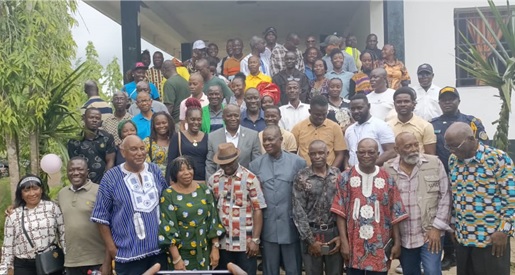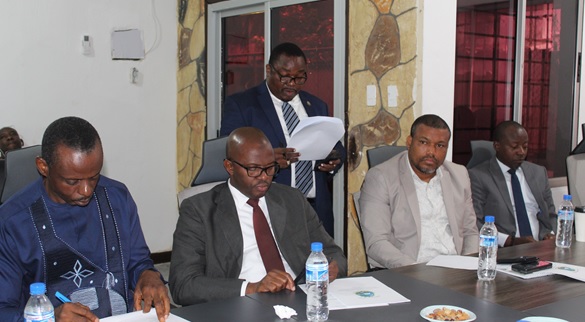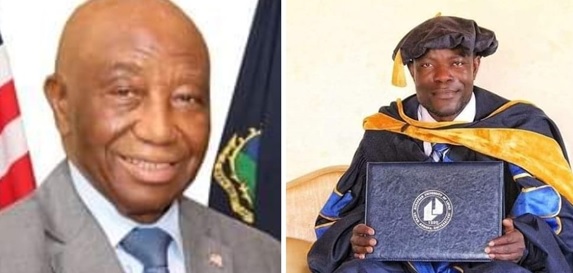SUAKOKO, LIBERIA- Aspiring an institute of excellence, the newly inducted Director-General of the Central Agricultural Research Institute (CARI), envisions rebranding the center into a fully functional agricultural research institute in Liberia.
Disclosing his acceptance address Thursday, August 8, 2024, at the CARI main office in Suakoko, Bong County, Dr. Arthur Bob Karnuah, Director-General, promises to make the institution a center of excellence viable for agricultural research and innovation in the country and beyond.
The Director-General realizes that CARI, a national research institute and an international agricultural research institute in Africa and the world at large, doing away with politics at CARI will certainly allow the institute to function as a scientific research center of excellence.
“Certain institutions, like that of CARI, are built on a particular capacity, and it is such capacity when employed will contribute meaningfully to the growth and development of that institution,” the Director-General adds.
The core values of his agenda, according to Dr. Karnuah, include scientific excellence, creativity, integrity, leadership, collaboration, accountability, transparency, diversity, inclusiveness and public service.
Coupled with more than 20 years of experience in agricultural research, livestock and poultry management and production, extension services, and animal science, Dr. Karnuah specializes in animal science (breeding and genetics), functional genomics, and molecular genetics (biotechnology) for agriculture and animal industry development.
He restates that during his administration, the institute is moving toward conducting applied client-oriented and adaptive research in agriculture and natural resources, to inform policymakers on options to increase agricultural productivity and production without detriment to the natural resource base and to the environment.
“We will increase food security by contributing to sustainable agricultural growth and an effective agricultural research system. We will create a team and a network of researchers dedicated to the promotion of technologies that will reduce producer and consumer risks, increase local production, and generate wealth,” according to Dr. Karnuah.
Rallying support, the Director-General encourages CARI staff as he looks forward to a cordial and productive working relationship that has three main ingredients: respect, integrity, and teamwork.
Though he utters his interest in the processes, not personalities, his doors are opened, stressing: “I am not here to witch-hunt anyone, but to see that we will work and live up to our duties and responsibilities as scientists, researchers and staff of CARI.”
Noting that rewards and promotion will be based on merit and excellent performance, Dr. Karnuah further asserts: “No doubt, we all will be making extra efforts and personal sacrifices. Those efforts will be recognized by the people around us and may eventually lead to improvement and CARI development.”
Quoting President Joseph N. Boakai’s cliché “There will be no business as usual,” he adds that the first responsibility of a leader is to define reality. “The last is to say thank you; in between, the leader is a servant.”
According to the Act establishing CARI, to be appointed as Director-General of this institution one has to be vetted by the committee after which the name is submitted to the President of Liberia for appointment. But in the past, others have been appointed based on political interference.
Over the years, CARI has been the center of attention for varying reasons, including lack of support to facilitate research activities, protests over salary harmonization and working conditions, political interference, and little or no supply of goods and services, among others.
The institution was badly affected by the harmonization policy proffered by the Congress of Democratic Change-led government of former President George M. Weah. Salaries were sliced, ranging between 50 percent for professional staff and 40 percent for non-professionals.
Socio-economic pundits believed that the harmonization policy has been the root cause of all the protests at the institution in recent years. The Board is resolved to turn the wheel to restore sanity to the research institute.
Addressing the Board while officially turning over the gavel of authority, Dr. James S. Dolo criticizes the Board for planning the event without the knowledge of the CARI senior management team. Over the last four months as the officer-in-charge, he and his team worked hard to depoliticize growing tension on the ground.
“We were not informed about the turning over ceremony. CARI was overlooked. I was shocked when I saw a communication that was distributed by the office of the Board chair along with the agenda of the program,” Dr. Dolo, adds.
Speaking earlier, Dr. J. Alexander Nuetah, Minister of Agriculture, assures CARI staff there will be “no business as usual,” a cliché, meaning upholding integrity.
The Minister of Agriculture, who is also chair of the Board, cautions CARI to do away with politics as this tends to undermine the growth and development of the institution.
Also citing that there is “Going to be no business as usual,” Minister Nuetah asserts: “If you are a politician, then CARI is not good for you, join me at the ministry where politics is. If you are a researcher, the place is good for you, but if you are a research politician, just pack your load and go.”
Similarly, the Minister warns that gone are the days when political interference was the order of the day as this Director-General is not answerable to any lawmakers.
Also in a remark, Dr. Inoussa Akintayo, AfricaRice country representative, promises to provide mentorship and coaching for young scientists at the research center. He has been working in the sector for over the last 40 years. AfricaRice has been collaborating with CARI to implement projects.
The Act approved by the national legislature on December 22, 2014, it mandates CARI to build and establish a strengthened research capacity that reinforces and supports the agricultural component of the national development agenda by establishing, building, and sustaining programs and interventions supportive of a commercially oriented agricultural sector propelled by research, technology transfer, innovations, knowledge and approaches that would contribute to an improved quality of life for Liberians and partners.







